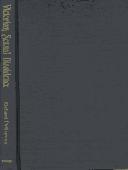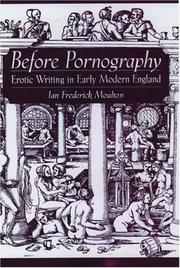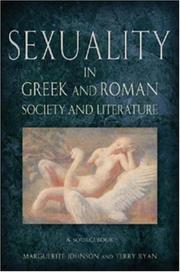| Listing 1 - 10 of 13 | << page >> |
Sort by
|
Book
Abstract | Keywords | Export | Availability | Bookmark
 Loading...
Loading...Choose an application
- Reference Manager
- EndNote
- RefWorks (Direct export to RefWorks)
Book
ISBN: 9789004548374 9004548378 9004548386 9789004548381 Year: 2023 Publisher: Leiden Brill
Abstract | Keywords | Export | Availability | Bookmark
 Loading...
Loading...Choose an application
- Reference Manager
- EndNote
- RefWorks (Direct export to RefWorks)
The cryptic figure of the cinaedus recurs in both the literature and daily life of the Roman world. His afterlife – the equally cryptic catamite – appears to be well and alive as late as Victorian England. But who was the cinaedus ? Should we think of a real group of individuals, or is the term but a scare name to keep at bay any form of threating otherness? This book, the first coherent collection of essays on the topic, addresses the matter and fleshes out the complexity of a debate that concerns not only Roman cinaedi but the foundations of our theoretical approach to the study of ancient sexuality.
Sex customs --- Sex --- Homosexuality --- Sex customs in literature
Book
ISBN: 081394337X 0813943396 0813943388 9780813943381 9780813943374 9780813943398 Year: 2019 Publisher: Charlottesville
Abstract | Keywords | Export | Availability | Bookmark
 Loading...
Loading...Choose an application
- Reference Manager
- EndNote
- RefWorks (Direct export to RefWorks)
"What is the role of sex in the age of democratic beginnings? "Erotic Citizens" answers this question by revealing the political workings of extramarital erotic intimacy, when the democratic subject, a figure at the center of the early US republic's nation-building project, is filled with a curious kind of yearning that only illicit sexual desire can represent. For as much as readers might say about the sober republican ideals of the Enlightenment in America and abroad, the literature of this era speaks of unruly, carnal longings. Through an examination of philosophical tracts, political cartoons, frontispiece illustrations, portraiture, and the novel from the antebellum period, this study advances a new understanding of how the terms of embodiment and selfhood function to define national belonging. From a story of survival authored by a North Carolina slave woman to a philosophical treatise penned by an English earl, the readings included in this study employ the trope of sexual ruin to tell their tales. They turn to the errant-yet often irrepressibly bewitching-sensate encounters among libertines, coquettes, and concubines to define the spirit of the age. They show, again and again, that to build a nation is to undo the virtue of a woman. "Erotic Citizens" explains why. By exploring the far-ranging impact of post-revolutionary American literature's more prurient aspects, "Erotic Citizens" shows how this era's depiction of the sometimes erotic, sometimes violent complexion of extramarital sexual encounter defines illicit sex as the point of entry into democracy. In her in-depth analysis, Dill reveals that the genre's defining principle is its repudiation of the individual as the centerpiece of a democratic polity, through its portrayals of the sexually ruined body's operational lack of individual will. Ultimately, this book explains why the new American republic witnessed a proliferation of texts about sexual ruin, as it investigates the ruin genre's claim that the democratic body must by its very nature also be a ruined one"--
American fiction --- Sex customs in literature. --- Sex in literature. --- History and criticism.
Book
ISBN: 147446310X 1474463096 147446307X Year: 2023 Publisher: Edinburgh : Edinburgh University Press,
Abstract | Keywords | Export | Availability | Bookmark
 Loading...
Loading...Choose an application
- Reference Manager
- EndNote
- RefWorks (Direct export to RefWorks)
This text sheds light on the contributions of architecture and its literary representations to a series of changes taking place in sexual culture during the late nineteenth and early twentieth centuries in France, England, Germany and Austria.
Neo-Victoriansk kultur --- Seksualitet --- Arkitektur --- Architecture in literature. --- Sex customs in literature. --- Architecture, European --- Architecture and society --- European literature --- Sex customs --- History --- History and criticism.
Book
ISBN: 1108912133 1108917496 1108831516 Year: 2023 Publisher: Cambridge, United Kingdom : New York, NY : Cambridge University Press,
Abstract | Keywords | Export | Availability | Bookmark
 Loading...
Loading...Choose an application
- Reference Manager
- EndNote
- RefWorks (Direct export to RefWorks)
Can sexual restraint be good for you? Many Victorians thought so. This book explores the surprisingly positive construction of sexual restraint in an unlikely place: late nineteenth-century Decadence. Reading Decadent texts alongside Victorian writing about sexual health, including medical literature, adverts, advice books, and periodical articles, it identifies an intellectual Paterian tradition of sensuous continence, in which 'healthy' pleasure is distinguished from its 'harmful' counterpart. Recent work on Decadent sexuality concentrates on transgression and subversion, with restraint interpreted ahistorically as evidence of repression/sublimation or queer coding. Here Sarah Green examines the work of Walter Pater, Lionel Johnson, Vernon Lee, and George Moore to outline a co-extensive alternative approach to sexuality where restraint figured as a productive part of the 'aesthetic life', or a practical ethics shaped by aesthetic principles. Attending to this tradition reveals neglected connections within and beyond Decadence, bringing fresh perspective to its late nineteenth- and twentieth-century reception.
Book
Year: 2012 Publisher: [Place of publication not identified] Cornell University Press
Abstract | Keywords | Export | Availability | Bookmark
 Loading...
Loading...Choose an application
- Reference Manager
- EndNote
- RefWorks (Direct export to RefWorks)
English literature --- Homosexuality and literature --- Male homosexuality --- Sex scandals --- Sexual orientation in literature --- Sex customs in literature --- History and criticism --- History --- Symonds, John Addington, --- Wilde, Oscar, --- Sexual behavior. --- Trials, litigation, etc. --- London (England) --- Social life and customs --- In literature.

ISBN: 0226142272 0226142264 Year: 1999 Publisher: Chicago London The University of Chicago Press
Abstract | Keywords | Export | Availability | Bookmark
 Loading...
Loading...Choose an application
- Reference Manager
- EndNote
- RefWorks (Direct export to RefWorks)
Recent critical and historical work on the late-Victorian period has furnished a vocabulary for discussing gender and sexuality. These popular terms include categories such as homo/hetero, patriarchal/feminist, and masculine/effeminate. This collection exploits this framework--while refining and resisting it in places--to show how certain Victorians imagined difference in ways that continue to challenge us today. One essay, for example, traces the remarkable feminist appropriation of male-identified fields of study, such as Classical philology. Others address the validation of male bodies as objects of desire in writing, painting, and emergent modernist choreography. The writings shed light on the diverse interests served by a range of cultural practitioners and on the complex ways in which the late Victorians invented themselves as modern subjects. This volume will be essential reading for students of British literary and cultural history as well as for those interested in feminist, gay, and lesbian studies. Contributors are: Oliver Buckton, Richard Dellamora, Dennis Denisoff, Regenia Gagnier, Eric Haralson, Andrew Hewitt, Christopher Lane, Thaïs Morgan, Yopie Prins, Kathy Alexis Psomiades, Julia Saville, Robert Sulcer, Jr., Martha Vicinus.
Coutumes sexuelles dans la littérature --- Gay men in literature --- Hommes homosexuels dans la littérature --- Homoseksuele mannen in de literatuur --- Lesbians in literature --- Lesbiennes dans la littérature --- Lesbiennes in de literatuur --- Seksuele gewoonten in de literatuur --- Sex customs in literature --- English literature --- Gay men in literature. --- Gays' writings, English --- Homosexuality and literature --- Lesbians in literature. --- Sex customs in literature. --- History and criticism. --- History --- 19th century --- History and criticism --- Great Britain --- Gays' writings [English ]

ISBN: 1280473665 9786610473663 0195350359 0195180461 9780195350357 9780195180466 1423722183 9781423722182 9780195137095 0195137094 6610473668 9781280473661 019517982X 0197711669 Year: 2000 Publisher: Oxford Oxford University Press
Abstract | Keywords | Export | Availability | Bookmark
 Loading...
Loading...Choose an application
- Reference Manager
- EndNote
- RefWorks (Direct export to RefWorks)
Explores the relationship between erotic writing, masculinity, and national identity in Renaissance England. This work argues that pornography is a historical phenomenon. It addresses the social significance of eroticism in such canonical texts as "Sidney's Defense of Poesy" and "Spenser's Faerie Queene".
English literature --- Sex in literature. --- Erotic literature, English --- Sex customs --- Sex customs in literature. --- Customs, Sex --- Human beings --- Sexual behavior --- Sexual practices --- Manners and customs --- Moral conditions --- Sex --- History and criticism. --- History --- Early modern, 1500-1700 --- History and criticism --- Sex in literature --- Erotic literature [English ] --- Sex customs in literature --- Sex customs - England - History - 16th century. --- Sex customs - England - History - 17th century. --- Masculinity in literature. --- Thematology --- anno 1500-1799

ISBN: 9780415173315 0415173302 0415173310 9780415173308 9780203645826 0203645820 1134689470 1283962349 1280361026 9786610361021 6610361029 9781280361029 9781134689477 9781283962346 9781134689422 9781134689460 1134689462 Year: 2005 Publisher: London Routledge
Abstract | Keywords | Export | Availability | Bookmark
 Loading...
Loading...Choose an application
- Reference Manager
- EndNote
- RefWorks (Direct export to RefWorks)
"With numerous original translations of ancient poetry, inscriptions and documents, this volume is the first major sourcebook to explore the multifaceted nature of sexuality in antiquity." "Themes such as marriage, prostitution and same-sex attraction are presented comparatively, with material from Greece and Roman worlds shown side by side; this approach allows readers to interpret the written records with a full awareness of the different context of these separate but related societies. Commentaries are provided throughout, focusing on vocabulary and social and historical context."--Jacket.
Sex customs in literature. --- Sex customs in literature --- Classical literature --- Greek World. --- History, Ancient. --- Literature. --- Roman World. --- Sex customs --- Sex in literature. --- Sex --- Sexual Behavior --- Social Conditions --- History and criticism. --- History --- history. --- Sex in literature --- Gender (Sex) --- Human beings --- Human sexuality --- Sex (Gender) --- Sexual behavior --- Sexual practices --- Sexuality --- Sexology --- Customs, Sex --- Manners and customs --- Moral conditions --- History and criticism --- History, Ancient --- Greek World --- Literature --- Roman World --- history --- Classical literature - History and criticism --- Sex customs - Greece - History - To 500 --- Sex - Greece - History - To 500 --- Sex customs - Rome --- Sex - Rome --- Sexual Behavior - history --- Social Conditions - history
Book
ISBN: 9780748644650 9780748644667 0748644660 0748644652 9780748649198 0748649190 9780748649204 0748649204 Year: 2022 Publisher: Edinburgh
Abstract | Keywords | Export | Availability | Bookmark
 Loading...
Loading...Choose an application
- Reference Manager
- EndNote
- RefWorks (Direct export to RefWorks)
A compelling cultural reinterpretation of humanist discourses of boyhood The English epyllion, the highly erotic mythological verse that swept the London literary scene in the 1590s, is as much about rhetoric as about sex. So argues William Weaver in this fascinating study of Renaissance education and poetry. Rhetoric, moreover, is erotic. Far being merely formal, rhetoric is the key to deciphering the cultural meanings of an enigmatic genre. Weaver attends to one of the epyllion's defining dramas: boys in transition to adulthood. Whereas recent studies of the epyllion have posited sexuality a
Boys in literature. --- English poetry -- Early modern, 1500-1700 -- History and criticism. --- Epic poetry, English -- History and criticism. --- Masculinity -- England -- History -- 16th century. --- Sex customs -- England -- History -- 16th century. --- Sex customs in literature. --- Sex in literature. --- Epic poetry, English --- English poetry --- Sex in literature --- Sex customs in literature --- Boys in literature --- Sex customs --- Masculinity --- English --- Languages & Literatures --- English Literature --- Customs, Sex --- Human beings --- Sexual behavior --- Sexual practices --- Manners and customs --- Moral conditions --- Sex --- English literature --- Masculinity (Psychology) --- Sex (Psychology) --- Men --- English epic poetry --- History and criticism --- History --- History and criticism.
| Listing 1 - 10 of 13 | << page >> |
Sort by
|

 Search
Search Feedback
Feedback About UniCat
About UniCat  Help
Help News
News